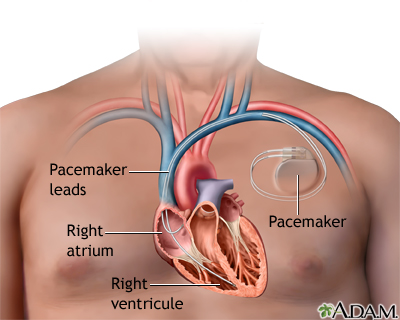What is Pacemaker Implantation?
A pacemaker implantation is a medical procedure in which a small device called a pacemaker is surgically placed under the skin near the heart. This device helps regulate the heartbeat by sending electrical impulses to the heart when it beats too slowly or irregularly. The pacemaker ensures that the heart maintains a regular rhythm, preventing issues like dizziness, fatigue, and more serious complications like heart failure or stroke.
The pacemaker consists of a pulse generator (battery-powered device) and one or more leads (wires) that connect it to the heart. It continuously monitors the heart's rhythm and corrects abnormal rhythms by delivering electrical impulses.
Understanding Heart Rhythm Disorders and When Pacemaker Implantation is Needed
Heart rhythm disorders, or arrhythmias, occur when the heart beats too fast, too slow, or irregularly. A pacemaker is typically recommended when:
- The heart beats too slowly (bradycardia), causing symptoms like dizziness, fainting, or fatigue.
- The heart's electrical system fails to properly coordinate the heartbeat.
- There is a risk of heart block, where electrical signals fail to pass through the heart properly.
- The patient experiences irregular heart rhythms that affect daily functioning and health.
Pacemakers can also be used for other conditions, such as atrial fibrillation, heart failure, and certain congenital heart conditions.
Types of Pacemaker Implantation Procedures
There are different types of pacemaker implantation procedures, depending on the condition being treated:
- Single-Chamber Pacemaker: This type of pacemaker has one lead that connects to either the right atrium or right ventricle. It is used for simpler heart rhythm issues where one part of the heart is not functioning correctly.
- Dual-Chamber Pacemaker: This device has two leads – one in the right atrium and one in the right ventricle. It helps regulate the timing between the atrium and ventricle, which is helpful in conditions like heart block or atrial fibrillation.
- Biventricular Pacemaker: A biventricular pacemaker is used in patients with severe heart failure. It helps synchronize the two lower chambers of the heart (ventricles) to improve heart function.
- Leadless Pacemaker: A leadless pacemaker is a newer, minimally invasive option. It’s implanted directly into the heart without the need for external leads, offering a less invasive solution with quicker recovery.
Benefits of Pacemaker Implantation
Pacemaker implantation provides several benefits:
- Restoration of Normal Heart Rhythm: Pacemakers regulate the heart’s rhythm, allowing it to function efficiently and avoid the risks of arrhythmias.
- Symptom Relief: Many patients experience significant relief from symptoms such as dizziness, fainting, and shortness of breath, which improves overall quality of life.
- Improved Heart Function: A pacemaker helps maintain a stable heart rate, preventing complications associated with irregular heartbeats, such as heart failure or stroke.
- Long-Term Solution: Pacemakers can be used for many years and only need periodic checks and battery replacement (every 5-10 years).
Recovery After Pacemaker Implantation
The recovery time after pacemaker implantation is typically shorter than many other heart surgeries. The recovery process involves:
- Initial Recovery: Patients may stay in the hospital for 1-2 days for observation and to monitor the device's functionality. Pain management and wound care are important during this time.
- Physical Activity: After discharge, patients are advised to avoid strenuous activities for a few weeks to allow the pacemaker to settle in place.
- Follow-up: Regular follow-up visits to check the pacemaker's performance and battery status are necessary. Some patients may need to adjust the settings based on their heart’s condition.
- Full Recovery: Most patients resume normal activities within 2 to 4 weeks. Full recovery is typically achieved within a few months.
Factors Affecting the Cost of Pacemaker Implantation in India
Several factors influence the overall cost of pacemaker implantation in India, including:
- Hospital Reputation: World-renowned hospitals may charge higher fees, but they offer the highest standards of care.
- Type of Pacemaker: Advanced pacemakers, like leadless pacemakers or biventricular devices, may cost more than standard single-chamber or dual-chamber devices.
- Surgeon’s Expertise: Highly experienced and specialized cardiac surgeons may charge higher fees, but their skill can ensure better outcomes.
- Post-Surgical Care: Pre-surgical consultations, diagnostic tests, medications, and post-operative care add to the overall cost.
Choosing India for Pacemaker Implantation: A Cost-Effective Medical Tourism Destination
India has become a leading destination for pacemaker implantation, offering the following advantages:
- World-Class Healthcare: India has a number of internationally accredited hospitals equipped with state-of-the-art technology for pacemaker implantation.
- Experienced Cardiac Surgeons: India is home to some of the world’s top cardiac surgeons who specialize in pacemaker implantation and heart rhythm disorders.
- Affordable Costs: The cost of pacemaker implantation in India is much lower compared to Western countries, making it a popular choice for medical tourists.
- Comprehensive Services: Medical tourism agencies in India provide all-inclusive packages, covering surgery, accommodation, transportation, and recovery services.
- Fast Access to Treatment: With shorter waiting times compared to other countries, patients can get pacemaker implantation without delay.
The Procedure: What to Expect
The pacemaker implantation procedure involves several steps:
- Pre-Surgery Consultations: The patient undergoes thorough testing, including ECG, echocardiogram, and blood tests, to assess the condition and plan the surgery.
- Anesthesia: The procedure begins with local anesthesia and sedation. The patient remains awake but comfortable throughout the surgery.
- Implanting the Pacemaker: The surgeon makes a small incision near the collarbone, creates a pocket for the pacemaker, and attaches the leads to the heart. The pacemaker is then implanted and tested to ensure proper function.
- Post-Surgery Care: The patient is monitored for complications and the pacemaker’s function. Follow-up appointments are scheduled to check the device.
Why Choose Healtour Solutions for Your Pacemaker Implantation in India?
At Healtour Solutions, we offer a range of services to assist you in your medical journey:
- Personalized Consultation: We help you choose the best hospital and surgeon for your pacemaker implantation based on your unique needs.
- Comprehensive Care: Our all-inclusive packages cover surgery, accommodation, transportation, and post-surgery care.
- International Patient Support: From visa assistance to airport transfers, we handle all the logistics to make your medical journey smooth and hassle-free.
Conclusion: Book Your Pacemaker Consultation Today
Pacemaker implantation is a life-changing procedure that can significantly improve the quality of life for those with heart rhythm disorders. With affordable treatment options, highly skilled surgeons, and world-class healthcare facilities, India is the go-to destination for pacemaker implantation. Contact Healtour Solutions today for a consultation and take the first step towards better heart health.
FAQs About Pacemaker Implantation
1.What is a pacemaker?
A pacemaker is a small device implanted under the skin near the heart to help regulate the heartbeat.
2. How do I know if I need a pacemaker?
A pacemaker is recommended for people with bradycardia, heart block, or irregular heart rhythms that affect quality of life.
3. Is pacemaker implantation safe?
Yes, pacemaker implantation is a safe and commonly performed procedure with high success rates.
4. How long does pacemaker implantation take?
The procedure typically takes 1-2 hours.
5. What is the recovery time?
Recovery usually takes 2-4 weeks, with most patients resuming normal activities in about a month.
6. Will I feel pain during the surgery?
No, the procedure is done under local anesthesia with sedation, so there is no pain during the surgery.
7. How long does a pacemaker last?
A pacemaker lasts 5-10 years, depending on usage, after which the battery needs to be replaced.
8. What are the risks of pacemaker implantation?
Risks are rare but may include infection, bleeding, or problems with the device.
9. What is the cost of pacemaker implantation in India?
The cost ranges from $3,000 to $6,000 USD, making it affordable compared to other countries.
10. Why should I choose India for pacemaker implantation?
India offers affordable care, world-class hospitals, and experienced surgeons for pacemaker implantation.






